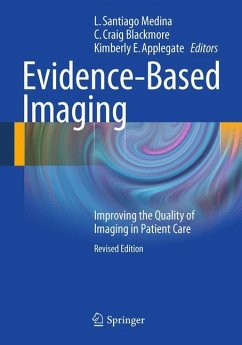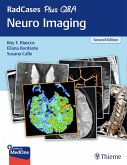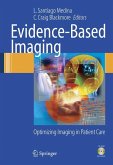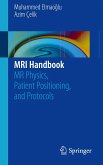Evidence-Based Imaging is a user-friendly guide to the evidence-based science and merit defining the appropriate use of medical imaging in both adult and pediatric patients. Chapters are divided into major areas of medical imaging and cover the most prevalent diseases in developed countries, including the four major causes of mortality and morbidity: injury, coronary artery disease, cancer, and cerebrovascular disease. This book gives the reader a clinically-relevant overview of evidence-based imaging, with topics including epidemiology, patient selection, imaging strategies, test performance, cost-effectiveness, radiation safety and applicability. Each chapter is framed around important and provocative clinical questions relevant to the daily physician's practice. Key points and summarized answers are highlighted so the busy clinician can quickly understand the most important evidence-based imaging data. A wealth of illustrations and summary tables reinforces the key evidence.
This revised, softcover edition adds ten new chapters to the material from the original, hardcover edition, covering radiation risk in medical imaging, the economic and regulatory impact of evidence-based imaging in the new healthcare reform environment in the United States, and new topics on common disorders.
By offering a clear understanding of the science behind the evidence, Evidence-Based Imaging fills a void for radiologists, family practitioners, pediatricians, surgeons, residents, and others with an interest in medical imaging and a desire to implement an evidence-based approach to optimize quality in patient care.
This revised, softcover edition adds ten new chapters to the material from the original, hardcover edition, covering radiation risk in medical imaging, the economic and regulatory impact of evidence-based imaging in the new healthcare reform environment in the United States, and new topics on common disorders.
By offering a clear understanding of the science behind the evidence, Evidence-Based Imaging fills a void for radiologists, family practitioners, pediatricians, surgeons, residents, and others with an interest in medical imaging and a desire to implement an evidence-based approach to optimize quality in patient care.
From the reviews:
"The format for the chapters is concise, consistent, commendable, and user-friendly. ... This book has a wide reading audience ranging from radiologists, clinicians, and radiation therapists to the trainees in each discipline. ... this book should also be read and used by third-party payers and individuals who are responsible for allocating imaging resources from the state to national levels ... . This is a must-have book for individual libraries, and copies should also be available to all individuals dealing with health care issues." (Aurelio Matamoros, Jr., The Journal of Nuclear Medicine, Vol. 53 (4), April, 2012)
"The format for the chapters is concise, consistent, commendable, and user-friendly. ... This book has a wide reading audience ranging from radiologists, clinicians, and radiation therapists to the trainees in each discipline. ... this book should also be read and used by third-party payers and individuals who are responsible for allocating imaging resources from the state to national levels ... . This is a must-have book for individual libraries, and copies should also be available to all individuals dealing with health care issues." (Aurelio Matamoros, Jr., The Journal of Nuclear Medicine, Vol. 53 (4), April, 2012)








